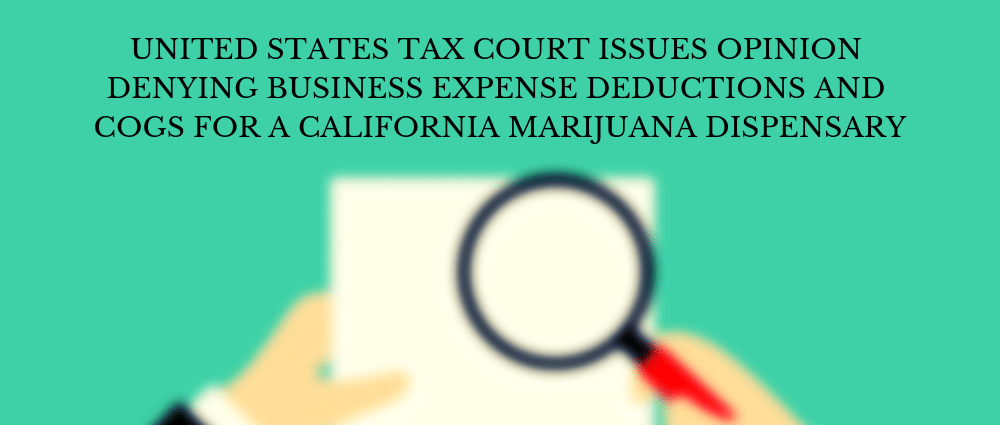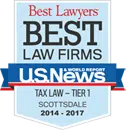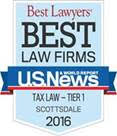Nevada Marijuana Businesses and Federal Income Tax Challenges Regarding Business Expense Deductions In 2001, the…
United States Tax Court Issues Opinion Denying Business Expense Deductions and COGS for a California Marijuana Dispensary
On December 20, 2018, The United States Tax Court issued a new opinion regarding the federal taxation of state regulated marijuana businesses, and our marijuana industry tax law attorneys have examined it carefully. The opinion addressed business deductions under Section 280E, whether a marijuana business operates a separate trade or business, flow through income from an S corporation to its individual shareholders, and cost of goods sold (COGS). Alternative Health Care Advocates, et al. v. Commissioner, 151 T.C. No. 13 (“Alternative”).

Silver Law PLC offers the highest quality and most thorough tax audit representation for dispensaries in Nevada.
Alternative is a California medical marijuana dispensary operating as a C corporation. Alternative acquired marijuana from its patient members, maintained growing marijuana plants, and processed marijuana into sellable forms such as edibles, tinctures, and dried flower. Alternative’s president also formed Wellness Management Group, Inc. as an S corporation to manage the daily operations of Alternative including hiring employees and paying expenses such as advertising, wages, and rent. Wellness was owned by four individual shareholders. Wellness maintained a separate office from the dispensary but used the dispensary’s address as its mailing address for the tax years at issue.
The dispensary employed (through Wellness) administrators, security personnel, marijuana processors, salespersons, and receptionists. Most of the dispensary’s floor space was used to acquire, process, and sell marijuana. Similarly, most employees’ time was spent on acquiring, processing, and selling marijuana; even security personnel, receptionists, and managers spent the bulk of their time processing and selling marijuana. The dispensary sold some non-marijuana products: books, T-shirts, pipes, rolling papers, lighters, and cleaning supplies for pipes and bongs. But these items took up very little floor space and employees spent few hours related to the sales of these products.
The IRS audited Alternative’s 2009 and 2010 tax returns, Wellness’ 2009 through 2012 tax returns, and the tax returns of Wellness’ individual shareholders. Our tax law attorneys have reviewed the findings and they follow as such:
Alternative’s Business Expense Deductions Under Section 280E
Alternative argued that it wasn’t in the business of “trafficking” marijuana and that it was entitled to its business deductions regardless of section 280E. Based on its section 280E line of cases under, the Tax Court gave short shrift to this argument and found that Alternative trafficked in a controlled substance by processing and selling marijuana, a federally illegal substance.
Next, Alternative argued that it was entitled to allocate its expenses between its trafficking and non-trafficking businesses because it operated a separate business selling non marijuana items.
Marijuana businesses may deduct business expenses related to a second, ancillary business that is completely separate from the sale of marijuana. Canna Care, Inc. v. Commissioner, T.C. Memo 2015-206; see also Californians Helping to Alleviate Medical Problems, Inc., v. Commissioner, 128 T.C. 173 (2007) (“CHAMPS”); see also Alterman & Gibson v. Commissioner, T.C. Memo. 2018-83.
But, as the Court set forth in Patients Mutual, the activities of separate entities can be treated as a single trade or business if they are part of a “unified business enterprise” with a single profit motive. Patients Mutual Assistance Collective Corp. v. Commissioner, 151 T.C. _____ (slip op. at 37)(Nov. 29, 2018). Alternative argued that it could allocate its expenses between trafficking and nontrafficking activities by using the percentage of employee time dedicated to each activity and the percentage of floor space devoted to each activity. The Court reviewed the trial testimony of two corporate officers and said this:
[T]he import of [their testimony] is that Alternative’s primary activity was operating a marijuana dispensary and the nonmarijuana activities were only ancillary – not occupying much time or space. Their allocation of floor space and employee activities both show that the receipt and sale of marijuana was the dominant activity that that the sale of nonmarijuana products had a “close and inseparable organizational and economic relationship” with – and was “incident to” – Alternative’s primary business of selling marijuana.
Citing Patients Mutual, 151 T.C. at ___ (slip op. at 41-42)(quoting Olive v. Commissioner, 139 T.C. 19, 41 (2012))). In sum, the Court disallowed all of Alternative’s claimed deductions for each tax year under section 280E.
Wellness’ Business Expense Deductions Under Section 280E
In the audit, the IRS also used section 280E to disallow the business expense deductions of Wellness, Alternative’s management company. Wellness argued the IRS wrongly applied Section 280E because: (1) Wellness is a management company that does not engage in the sale and purchase of marijuana; and (2) there are Tax Court cases to support the argument that a management services company can engage in a separate line of business from the entity it manages.
The Court decided the only difference between what Alternative did and what Wellness did (since Alternative acted through Wellness) is that Alternative had title to the marijuana and Wellness did not. All “Wellness employees were directly involved in the provision of medical marijuana to the patient-members of Alternative’s dispensary. We do not read the term ‘trafficking’ to require Wellness to have had title to the marijuana its employees were purchasing and selling.”
Since the Court upheld the IRS’ disallowance Wellness’ deductions, the consequence was that each shareholder had additional taxable income from Wellness (as a flow-through entity) in proportion to his or her ownership percentages.
Cost of Goods Sold (COGS)
For the years at issue, the IRS allowed all of the COGS claimed by Alternative. At trial, Alternative wanted more than it had claimed on its returns.
A taxpayer engaged in manufacturing or merchandising can subtract COGS from gross receipts to arrive at gross income. Secs. 1.61-3(a), 1.162-1(a), Income Tax Regs. COGS is generally determined under section 471 and its accompanying regulations. In calculating COGS, producers must include both the direct and indirect costs of creating their inventory. Secs. 1.471-3(c), 1.471-11, Income Tax Regs. Section 471 (and its regulations) also refer taxpayers to section 263A for additional rules, instructing both producers and resellers to include indirect inventory costs in COGS. 263A benefits producers and resellers because it broadens the definition of indirect costs. Compare sec. 1.264A-1(e)(3), Income Tax Regs., with sec. 1.471-11, Income Tax Regs. But section 263A puts into COGS only expenses otherwise deductible. Said another way, it adds otherwise deductible expenses to COGS.
Alternative argued that under section 263A, it was entitled to include both direct and indirect inventory costs in computing COGS. It did not detail what expenses it wanted to include in COGS beyond what the IRS allowed. It simply asked the Court to consider officer testimony regarding the dispensary’s square footage, estimated overhead, and estimated employee time. The Court said no. Because the indirect expenses Alternative wanted to include in COGS were not deductible by operation of section 280E, the expenses could not be included in COGS.
Alternative also argued that it was a producer for purposes of sections 263A and 471 and therefore entitled to include its production costs in inventory. The Court found that Alternative was not a producer because it acquired marijuana from its patient-members and did not improve the marijuana products it ultimately sold to the extent required by the regulations. Further, Alternative did not provide evidence allowing the Court to calculate these costs, even if they would have been allowable. And finally, the Court found that Alternative was not a producer because it never actually owned the marijuana it acquired and maintained for its patients. The regulations allow producers to include production costs in COGS if they own the property produced. No evidence, outside the president’s testimony, was available in the record to support Alternative’s argument that it owned the marijuana products it maintained for its patient-members.
Penalties
Section 6662(a)(1) and (b)(1) and (2) impose a 20% penalty on the portion of an underpayment attributable to any substantial understatement of income tax or negligence or disregard of rules or regulations. Negligence includes any failure to make a reasonable attempt to comply with the provisions of the Code, and disregard includes any careless, reckless, or intentional disregard. A corporation’s understatement of income tax is substantial when it exceeds the lesser of $10 million or “10 percent of the tax required to be shown on the return for the taxable year (or, if greater, $10,000).” Sec. 6662(d)(1)(B). In this case, the Court found substantial understatements.
A taxpayer can avoid penalties by showing that it acted with reasonable cause and in good faith. Sec. 6664(c)(1); sec. 1.6664-4(a), Income Tax Regs. The Court determines reasonable cause on a case by case basis. Reliance on professional advice may constitute reasonable cause and good faith if the taxpayer proves, by a preponderance of the evidence, that it meets the following test: (1) the advisor was a competent professional who had sufficient expertise to justify reliance, (2) the taxpayer provided necessary and accurate information to the advisor, and (3) the taxpayer actually relied in good faith on the advisor’s judgment. Neonatology Assocs., P.A. v. Commissioner, 115 T.C. 43, 99 (2000), aff’d, 299 F.3d 221 (3d Cir. 2002).
Alternative argued that the case law surrounding 280E was unsettled at the time it filed its returns and it therefore acted with reasonable cause and in good faith. But the Court seized on the fact that Alternative had stated on its returns that its business activity was “Medicine Sales.” It did not disclose anywhere on its returns that it was involved in the distribution of marijuana or that section 280E was at issue in any way. Further, Alternative did not offer evidence that it sought advice regarding the proper tax treatment for its transactions. It hired an accountant for return preparation, but it did not have evidence that it relied on the accountant for advice on the applicability of section 280E. In addition, Alternative only provided the accountant with its yearly financial statements to use in preparing its returns. Alternative did not show that it gave the accountant all the necessary information for proper preparation of its returns or that it relied on his advice. The Court upheld all penalties for each of the tax years.
Going forward, in order to avoid IRS penalties, it is necessary for marijuana businesses to keep meticulous books and records and to take reasonable positions on their returns. Guidance on COGS is becoming clearer with each opinion issued by the Court, and marijuana businesses need to pay close attention to the case law and any potentially forthcoming IRS regulations.
If you own a business selling, growing, or producing marijuana, you need to work with an experienced Marijuana tax lawyer in Arizona to understand your tax rights and responsibilities. The landscape is changing so quickly that you need a legal advocate on your side to help you navigate it all. If your business is audited and you don’t have detailed information about every single transaction, you risk forfeiting your COGS claim and you could be subject to penalties for filing an inaccurate tax return.
Silver Law PLC operates in Arizona and Nevada and all of its lawyers are former trial attorneys for the IRS. A tax lawyer from our team can help you understand how the complex Tax Code applies to your marijuana business operations. We’ll help you ensure that you are meeting your obligations. If you have been audited or are facing collections, we are also in a position to help you navigate that process. We can either find ways to bring down your tax debt or can negotiate a settlement for you. Call us today to talk with a tax lawyer and learn more.
For marijuana businesses seeking legal representation for tax issues, contact the Las Vegas tax attorneys at Silver Law PLC.

Email: lchapman@silverlawplc.com
Website: taxcontroversy.com
Arizona Location
7033 E. Greenway Pkwy, Ste 200
Scottsdale, AZ 85254
Office:(480) 429-3360
Henderson Location
410 South Rampart Blvd, Suite 390
Las Vegas, Nevada 89145
Office: (702) 801-1000
Las Vegas Location
410 South Rampart Blvd, Suite
390 Las Vegas, Nevada 89145
Office: (702) 726-6819
San Diego Location
7676 Hazard Center Drive, Suite
1525 San Diego, CA 92108
Office: (619) 387-3790
Coronado Location
724 1st St.
Coronado, CA 92118
Office: (619) 612-5337
Utah Location
11576 S. State Street, Suite 1002
Draper, Utah 84020
Office: (801) 340-7514
















Leave a Reply
You must be logged in to post a comment.